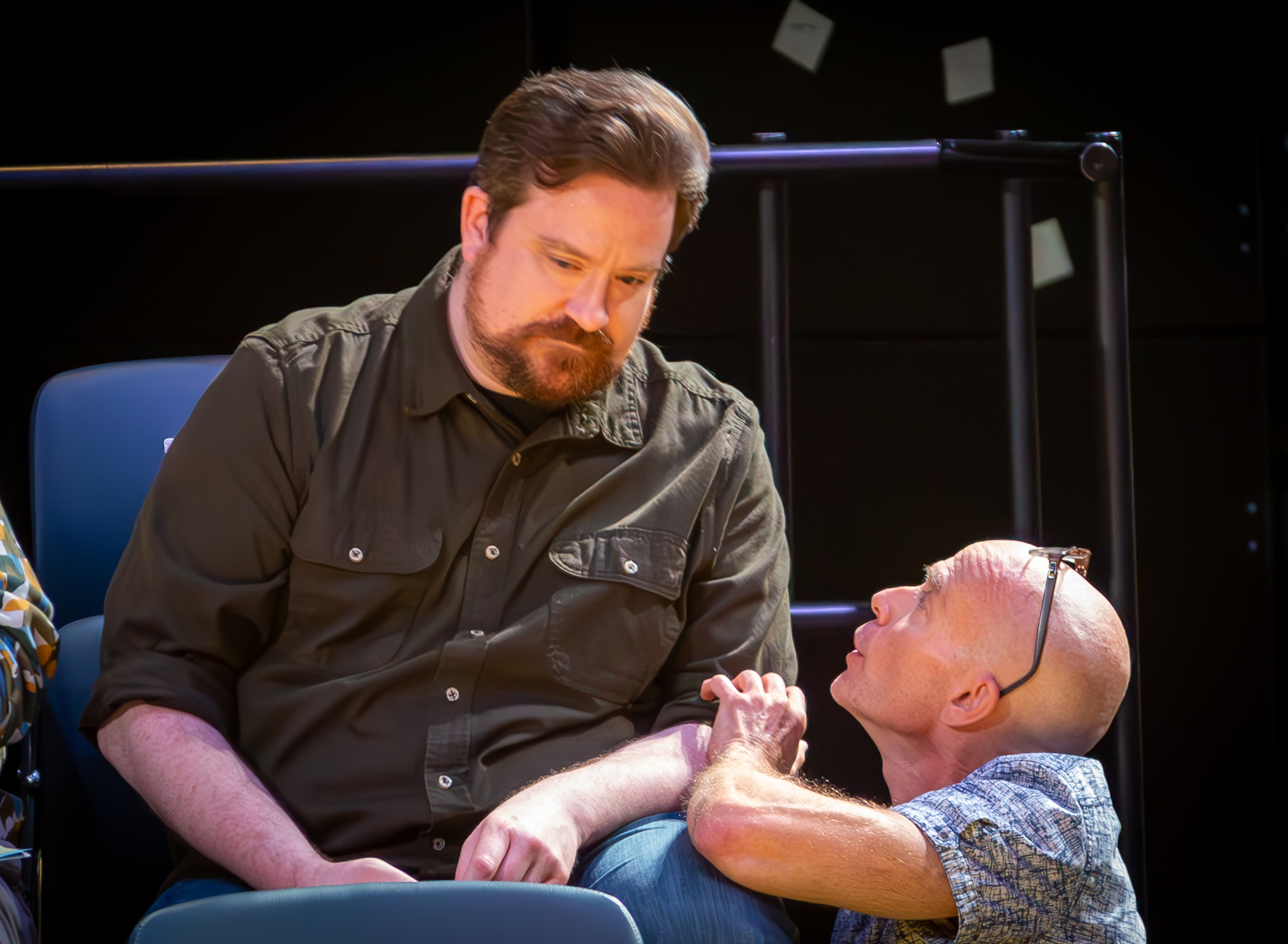An Experiment in Emotional Energy: ‘Every Brilliant Thing’ at Kinetic

Performer Marcus Weiss turns a one-man show into an all-hands celebration in ‘Every Brilliant Thing.’ (Photo: Rocky Raco)
Pittsburgh’s Kinetic Theatre closes its season with an ultra-kinetic production. Every Brilliant Thing (through June 11) is very different from most plays you might have seen. Imagine Hamlet redone as a single, supercharged, seriocomic soliloquy by the prince, in which he not only pokes mad fun at grim situations—as Shakespeare had him doing—but also dashes about the theater, enlisting members of the audience to help him act out his tale.
Which is not to say that the show is a masterpiece on a par with Hamlet. But Every Brilliant Thing raises similar themes, notably the question of whether life is worth living. (Spoiler alert: the answer is yes.) And if you are up for an unusual kind of theatrical trip—orchestrated with exuberant artistry by actor-slash-ringleader Marcus Weiss—then put yourself in a front row seat before this play’s run expires.
Flashbacks to the Backstory
Every Brilliant Thing emerged from the seriously quirky mind of British playwright Duncan MacMillan. He’s the one who created a BBC radio drama titled I Wish to Apologise for My Part in the Apocalypse. MacMillan is known for trying new ways to bring attention to social issues. His works for live theater have included 2071, a solo piece about the possible long term effects of climate change, co-written with and performed by the climate scientist Chris Rapley. MacMillan’s Lungs, a play that depicts a young couple agonizing over the decision to have a child, was staged locally by off the WALL productions in 2016.
Kinetic now presents the Pittsburgh premiere of a MacMillan number that’s had a long gestation period. Every Brilliant Thing developed from early versions at the Edinburgh Festivals. It was amped up with input from British comic artist Jonny Donahoe (the first performer of the piece in its current form) … jumped across the pond to off-Broadway in 2014 … and has been played by companies across North America since then.
So much for history. What’s singular about Brilliant Thing is its high-octane, glee-infused treatment of a pair of somber subjects: depression and suicide.
Coming Up from Life’s Downers
Every Brilliant Thing is played in the round. Well, actually, in a square, with the audience seated up close on four sides, as if to view a boxing match. Except there’s only one puncher, shadow-boxing with the demons of despair and, most of the time, winning.
Performer Marcus Weiss lays out the show’s fictional narrative. As a young boy, he lives in a family with a mother who tries to kill herself, more than once. Hoping to cheer her up, he writes her a list of all the “brilliant things” that make life worthwhile. They range from simple pleasures like ice cream (number one on the list) to, eventually, hundreds more. Including bizarre items such as “people falling down!”—which, if you’ve watched “America’s Funniest Videos,” is reliably good for a laugh.
The young boy grows into a young man. He courts and marries a young woman. Further adventures and crushing misadventures follow. But through it all, the list of brilliant things keeps growing, too, into the many thousands. Our hero will not be KO’d by his bouts of sadness. Nor is he alone.
Repeatedly, darting around the arena like an NBA point guard dishing out assists, actor Weiss finds random spectators and pulls them into his story. He taps a man to role-play a scene as his father. A lucky woman becomes the girl of his dreams, and so on. It’s an astounding display of scripted solo performance mixed with spur-of-the-moment group improv. Although Weiss gives the audience volunteers a quick bit of coaching on how to play their parts, he doesn’t know how they will respond. And yet time and again on the night I went—as well as, reportedly, on other nights—these hastily recruited amateurs deliver the goods. Weiss plays off them superbly.

Dad, oh Dad, what’s wrong with Mom? For a pivotal scene, Weiss has an audience member play his father. Acting the part admirably here is John Feightner. (Photo: Rocky Raco)
The whole affair gets the house rollicking. To say that Every Brilliant Thing “engages” the audience would be putting it much too formally. One question, however, remains. Is the show’s upbeat tone an appropriate way to deal with the gravity of the subject matter?
After the opening-night performance I spoke with around a dozen people who’d attended. Most loved the play; a few felt uneasy. Myself, I had some aesthetic quibbles with the narrative structure of Every Brilliant Thing. It kept me on board until the closing sequences, which, for me, didn’t add up to a meaningful send-off. But overall, the play is a rare experience that I would recommend. And I don’t feel qualified to speak with authority on clinical depression or suicide. So I will leave you with a little story.
As the World Turns
Perhaps you have read Archibald MacLeish’s poem “You, Andrew Marvell.” The poem is dark and spooky. In a series of brief scenes, it evokes the perpetual sweep of sunset around our Earth as the planet rotates, inviting us “To feel the always coming on / The always rising of the night.”
I first read the poem as a college freshman. But not in class. A fellow student had the habit of carrying around a copy. He showed it to me one day; urged me to reflect on it. In further talks with the guy I found him to be fascinatingly deep and wanted to get to know him better. Then came a time when I noticed I hadn’t seen him on campus lately. A mutual friend told me why: suicide.
So maybe, for me, Every Brilliant Thing comes across as an antithesis to “You, Andrew Marvell.” A reminder that the sun always rises again. This may be corny and trite and far from a solution to all that worries us, but it’s true.
Closing Credits and Ticket Info
Duncan MacMillan’s and Jonny Donahoe’s Every Brilliant Thing is directed for Kinetic Theatre by Andrew Paul, the company’s producing artistic director. Paul deserves much credit for bringing this distinctive play to Pittsburgh and for bringing in Las Vegas-based Marcus Weiss to perform it. Visit Kinetic on the web to reserve tickets. Through June 11 in the Richard E. Rauh Studio Theatre, on the basement (B) level of the Cathedral of Learning at Pitt. 4301 Forbes Ave., Oakland.
Scenic and property design for the show is by Johnmichael Bohach, lighting by Annmarie Duggan, and sound by Mark Whitehead. The stage manager is Cory Goddard.

According to Marcus, the downs are part of the deal: “If you live a long life without once being crushingly depressed, you haven’t been paying attention.” (Photo: Richard Brusky, courtesy of Vegas Theatre Company)
Mike Vargo, a Pittsburgh-based freelance writer, covers theater and visual arts for Entertainment Central.
Share on Social Media
Follow Entertainment Central
Latest Stories
Sign up for the EC Newsletter







